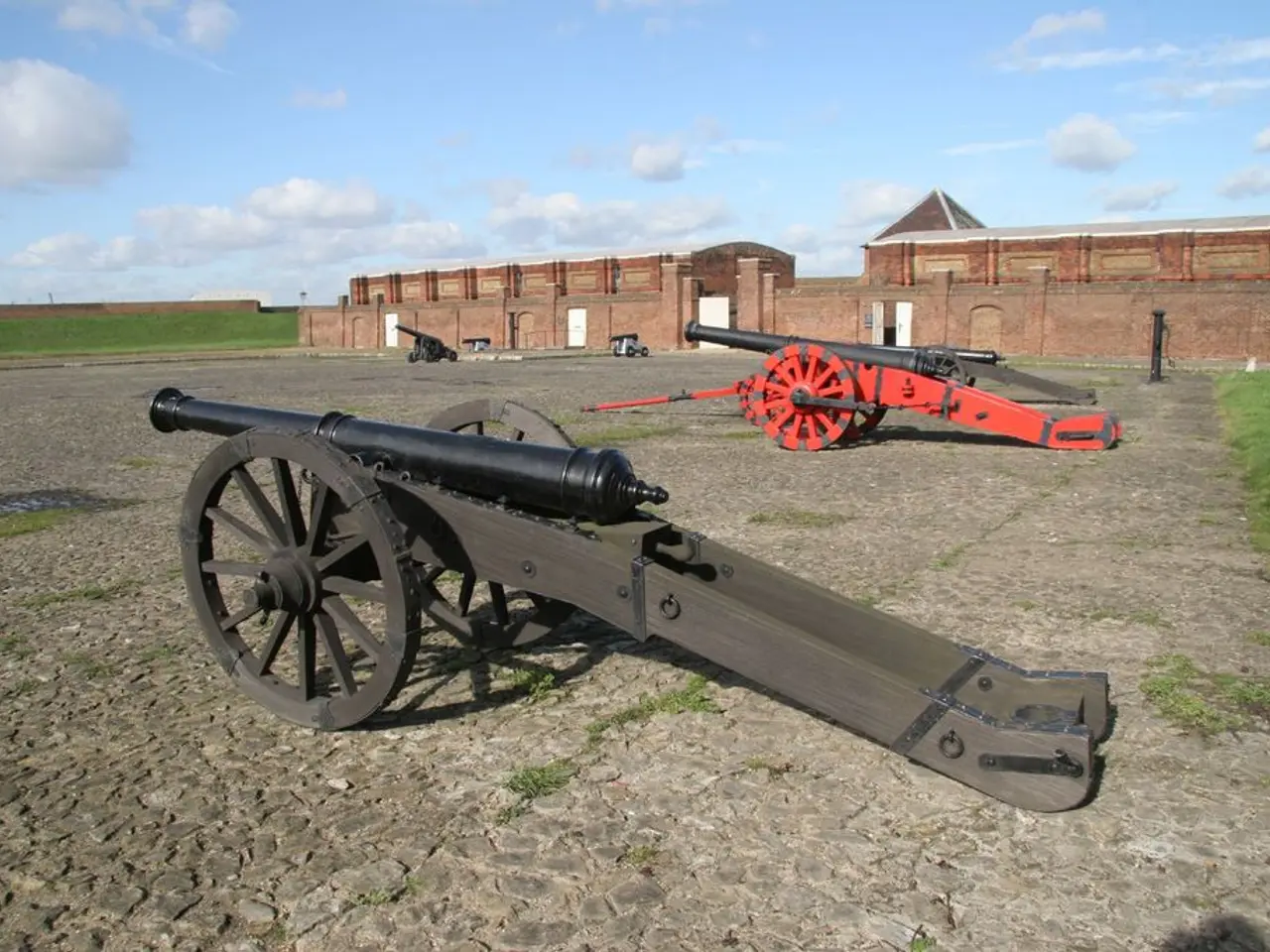Submerged English cannon discoveries off Helgoland by explorers
In the cold, clear waters of the North Sea, 16 ancient cannons have been discovered off the North Sea island of Helgoland. The cannons, dating back to around 1800, are 12-pounder cannons and carronades, and were identified by the distinctive Blomefield Ring, indicating their British origin.
The cannons were found scattered over an area of about 80 by 70 meters, with no wreckage or clear wreck structure in sight. This discovery complements earlier recoveries from the 1990s and underscores the island's significance in British naval history.
Florian Huber, an underwater archaeologist and project leader, made the announcement. The discoveries were made during systematic investigations by the Kiel-based research diving company Submaris, with the support of the working group Marine Geophysics & Hydroacoustics of the Kiel Christian-Albrechts-University.
Researchers suspect that these cannons were deliberately sunk by the British Navy before Helgoland was handed over to the German Reich in 1890. However, they are unlikely to be related to the sinking of HMS Explosion in 1807, but instead connected to an earlier period around the late 18th or early 19th century.
Helgoland's strategic importance in the North Sea makes it a fascinating site for maritime archaeology. The island was settled by Frisians and belonged to the Duchy of Schleswig since 1402. It changed hands between Britain and Germany in the 19th century, with a significant British Royal Navy presence during the Napoleonic Wars.
The British naval forces in that era commonly used carronades and 12-pounder guns, making it plausible that these recovered cannons are remnants from various naval events or British coastal defenses predating World War I.
The cannons recovered from the "HMS Explosion" in 1807 were brought ashore, whereas the newly discovered cannons remain submerged in the North Sea. These finds document the end of an era in Helgoland's maritime history and deepen our understanding of the island's past.
The discoveries confirm Helgoland's importance as a former British military stronghold, underscoring its significance in the coalition wars and British naval history. As research continues, the secrets of Helgoland's past are sure to reveal themselves, offering a glimpse into the island's rich maritime history.
- This discovery opens new chapters in the science of climate-change, as data from the North Sea can contribute to our understanding of its historical climate.
- The manufacturing industry must consider the environmental impact of scrap metal recovery from these ancient cannons.
- The finance sector should invest in research and development to protect our planet from the harmful effects of climate-change.
- The energy industry can learn from the history of these cannons, as their sinking might provide insights into human-made impacts on the ocean's energy stores.
- The space-and-astronomy field can draw parallels between the discovery of the cannons and the exploration of distant worlds, both uncovering unknown artefacts from the past.
- The aerospace industry may find inspiration in the precision with which these cannons were manufactured, honing its own techniques for crafting vehicles capable of withstanding extreme conditions.
- The retail sector can use this story as a marketing tool, appealing to consumers' interest in historical finds and eco-conscious products.
- The transportation industry can study the movement of goods and troops during the Napoleonic Wars, and apply lessons learned to modern logistics.
- The cybersecurity field can find relevance in the protection of underwater artifacts like the cannons, as it requires safeguarding them from potential theft or damage.
- The lifestyle sector can embrace the discovery as a symbol of heritage preservation and promote responsible practices towards our planet.
- In the world of fashion-and-beauty, designers might draw inspiration from the intricate details of the cannons for their newest collections.
- The food-and-drink industry might capitalize on the buzz surrounding the discovery by launching themed menu items or events.
- The investing community can watch for potential business opportunities that might arise from the increased tourism on Helgoland.
- The home-and-garden industry can create products inspired by the coastal landscape of Helgoland, showcasing the island's charm to homeowners.
- The business sector should collaborate with researchers and archaeologists, as their expertise is crucial in understanding the far-reaching impacts of the cannon discoveries.
- The personal-finance advisors can educate clients about sustainable investments in the environment-and-self-development sector, focusing on marine archaeology projects like this one.
- The banking-and-insurance sector should provide financial support for marine archaeology projects, ensuring their preservation and continued exploration.
- The gadget enthusiasts can showcase modern tech for detecting and mapping submerged objects, similar to those used in the discovery of the cannons.
- The data-and-cloud-computing experts can analyze the at-sea conditions and vessel movements during the cannon sinking period, providing valuable insights for climate-change research.
- The technology industry can develop advanced tools for underwater exploration, making them more accessible to researchers and hobbyists worldwide.
- The artificial-intelligence researchers can apply their skills to predict historical weather patterns based on oceanic factors, advancing climate-change research on a global scale.
- This discovery highlights the importance of maintaining relationships with international partners, as they are critical for collaborative research projects like this one.
- The pet owners can learn about the rich history of Helgoland, fostering a sense of connection and appreciation for their island home.
- The travelers can plan trips to Helgoland, experiencing the unique blend of history, nature, and contemporary culture.
- Car owners can journey to Helgoland, using their vehicles as a means to explore the island and support its economy.
- Book lovers can add Helgoland's history to their reading lists, immersing themselves in the stories of the marine archaeology and naval wars.
- The education-and-self-development community can incorporate the cannon discoveries into curricula, empowering students to explore the world's history.
- The entertainment industry can produce movies, TV shows, and games based on the exciting story of the cannon discoveries, capturing the imaginations of audiences and inspiring interest in maritime history.




